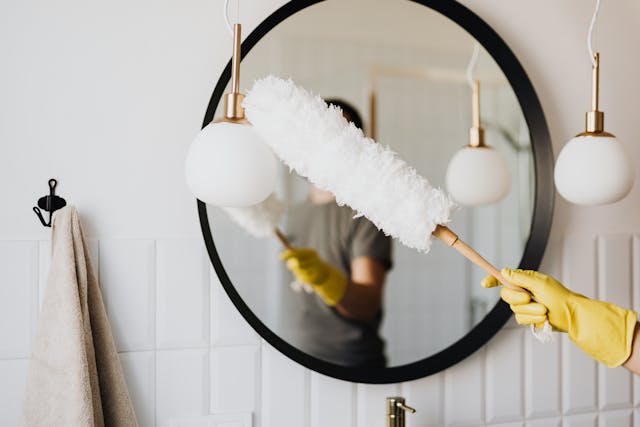Cleaning your home might seem like just another task on your to-do list, but doing household chores can be a powerful self-care act. When you tidy up your space, you’re also clearing your mind, reducing stress and giving yourself a fresh mental reset.
Household chores like sweeping or doing the dishes create small amounts of control and accomplishment that help you feel more grounded. They also encourage sustainable habits, such as reusing what you have and being mindful of your consumption. Cleaning allows you to slow down and reconnect with your space and yourself in a fast-paced environment.
The Psychology Of Clean Spaces
You’ve probably heard the phrase “external order reflects internal calm.” It’s true, your environment directly impacts how you feel. When your space is cluttered, your brain has to work overtime to process all the visual noise, which can lead to anxiety, overwhelm and depression.
It becomes harder to focus, relax or think clearly when everything around you feels chaotic. But when you tidy up, you’re not just cleaning. You create a sense of calm and control that your mind craves, especially during stressful times. Even a quick reset, like organizing your desk or clearing off a counter, can lift your mood and help you feel more in charge of your day.
How Chores Trigger Mindful States
Mindfulness means being fully present in the moment – aware of your thoughts, feelings and surroundings without letting them overwhelm you. It’s one of the most effective tools for managing emotions because it helps you control your attention and become more aware of how you respond to stress. When you practice mindfulness, you give yourself space to pause instead of racing on autopilot.
The best part is you don’t need a meditation app or a quiet room to do it. Everyday household chores like folding laundry or sweeping the floor can naturally put you in a mindful state. These simple, repetitive tasks pull your focus away from anxious thoughts and into the present moment – your hands, breath and movements. It’s a calming reset that helps your mind feel clearer and more controlled.
The Science Behind The Mood Boost
Cleaning does more than just make your space look good. It also boosts your brain. Moving your body with light chores like vacuuming or scrubbing counters releases endorphins that help reduce pain and lift your mood. This kind of physical activity mimics the benefits of low-intensity exercise, which can lower depression and anxiety levels.
Seeing the visible progress of your work triggers a dopamine hit, which gives you a real sense of satisfaction. People who do daily light chores often feel less stressed and more emotionally balanced. You can also feel joy after finishing a big reset session.
Sustainability, Safety And Emotional Health
When you make your routine more eco-friendly, you’re not just tidying up. You do something great for your mind and the planet. Decluttering your space, reusing what you can and reducing waste all create a sense of purpose that aligns with your values. Switching to homemade or low-toxicity products makes your home feel healthier and helps lower that invisible mental load that clutter and chemicals can bring.
Tools like robotic vacuums, smart mops and automated lawn mowers take the pressure off your body, which lets you keep your space clean without risking injury or overexerting yourself. Donating or upcycling instead of tossing things gives you that extra feel-good moment as you’ve positively impacted your home and wellbeing.
Creating A Therapeutic Cleaning Ritual
With a few intentional tweaks, you can turn everyday chores into simple self-care rituals. Start by creating a calming atmosphere. For example, you can play your favorite music or open a window for fresh air. You can also let a small goal, like wiping down surfaces or organizing one drawer, and treat it as a moment to reset.
Physical activity helps release stress by deepening your breathing and relaxing tense muscles, which gives your body a much-needed break from emotional buildup. When you’re feeling low or overwhelmed, even a 10-minute session can help you feel more in control and boost your energy. Over time, these mini rituals build emotional resilience by creating a rhythm of calm, clarity and care woven right into your daily life.
When Cleaning Becomes Harmful
Cleaning can boost your mood and help you feel more grounded, but knowing when it’s too much is essential. Suppose you catch yourself doing it nonstop or using chores to avoid tough emotions. It might be a sign you’re leaning on it as a coping mechanism instead of a healthy habit.
When cleaning turns into a way to control your surroundings because you feel overwhelmed, it can add more stress in the long run. If that ever feels true to you, don’t hesitate to contact a mental health professional. You deserve support that goes deeper than surface-level. Let the chore be a tool that supports your wellbeing, not something that takes over your peace of mind.
A Fresh Perspective On Everyday Cleaning
Household chores combine gentler movement and emotional release in a simple routine. When done intentionally, cleaning becomes more than a task. It’s a way to care for your mind, body and space. Rethink it as a small, daily act of kindness to yourself and the planet.
Author Bio
Jane is an environmental writer and the founder and editor-in-chief of Environment.co where she covers sustainability and eco-friendly living.

